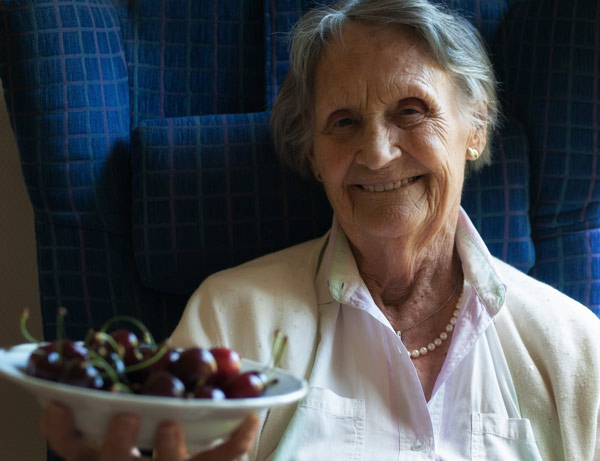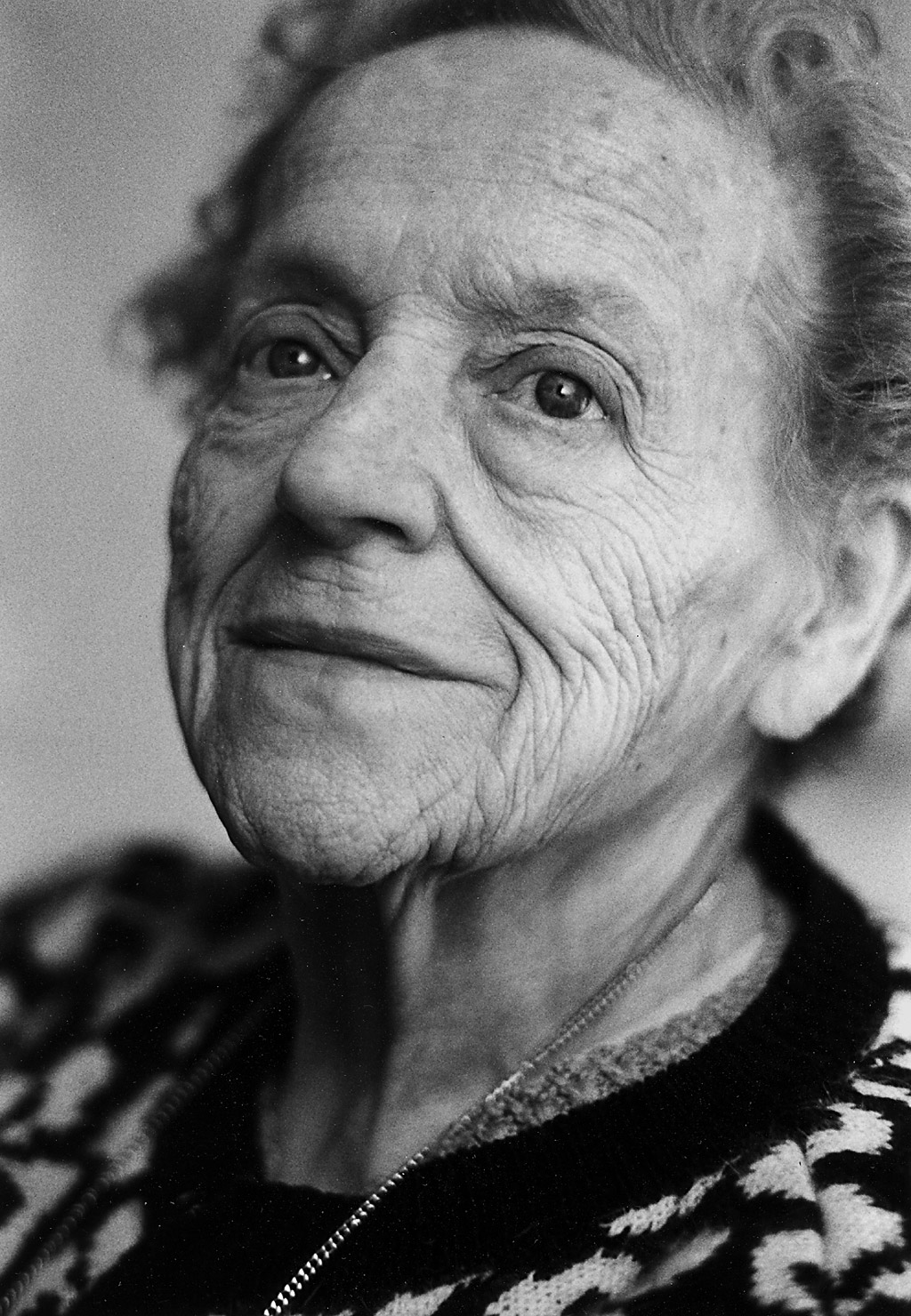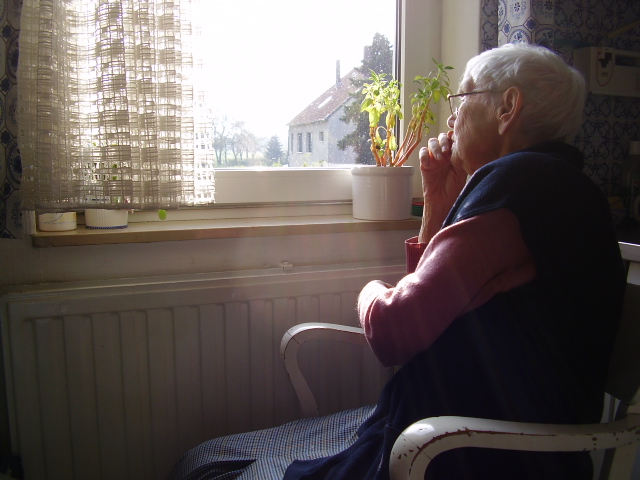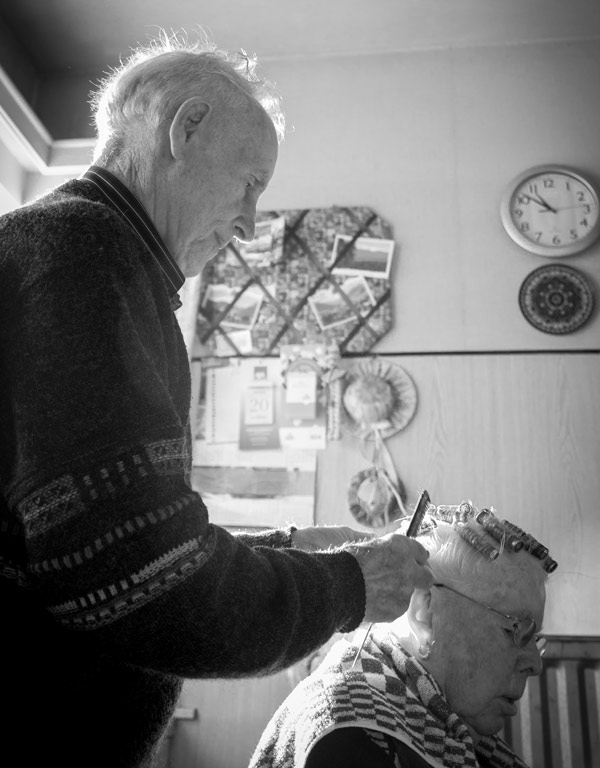Vlaams Ouderenraad Fotobank
PART 3 - Building a policy response to promote and support the rights of older persons in need of care at EU level
Parts 1 and 2 aim to provide an overview of current policies, strategies and legal instruments covering directly or indirectly the rights of older persons in need of care and support.
Part 3 aims to support concrete policy action to move forward for the wellbeing and dignity of older persons in need of care. It includes a general analysis of the different responses that have been introduced, and reminds readers about the realities faced by older persons in need of care. A policy in the field should first aim at producing positive outcomes on the target group; in that regard, it is essential to plan how to adequately enforce their rights in practice and promote their inclusion in society.
3.1 Realities faced by older persons in need of care

What often comes out of the debates is that many older persons in need of care are not aware of their rights, and have the feeling that, as they depend on others for care and support, they cannot or should not claim their rights.
We all have in mind situations where the rights of older persons in need of care have been overlooked: limitations to freedom of choice, absence of informed consent, discrimination in access to quality healthcare services and mental health support, limited possibilities for adequate support services, undervaluation of the person’s needs, lack of opportunities for participation, etc. However, these limitations may appear in many cases as a form of normality or fatality in our societies.
When referring to older persons in need of care, one needs to include all living settings, whether they live in a residential care home, at home, or day or night care settings.
The notions of ageism and of ‘structural abuse’
Such examples of limitations showcase a form of generalised ageism in society, of prejudice and discrimination targeting older persons, including, very notably, those in need of care and assistance.
This should not be accepted as it is a violation of the dignity of older persons and contradicts Article 25 of the EU Charter of fundamental rights, alongside other legal instruments.
In 2018, AGE launched a campaign, Ageing Equal, in order to explore the prevalence of ageism, its consequences on older individuals, and the intersection between ageism and other forms of discrimination. This campaign revealed the pervasiveness of ageism and the great extent to which it acts as a barrier to the equality of older people in society, thus putting at risk the dignity in older age. The campaign also explored specifically the links between ageism and abuse, and showed how closely the two are interrelated.
This inherent ageism translates into what we call structural abuse. Structural abuse means that older persons are not seen as rights holders but as ‘bed lockers’. This impacts not only the rights of older persons, but also the whole eldercare sector which is confronted with inappropriate funding, inadequate working conditions and training for carers and care managers, and a lack of positive recognition of their work and of the work done by informal carers. Ageism and structural abuse lead to a systematic underestimation of older persons as target group of actions and policies.
More information:
- The Ageing Equal campaign on ageism can be accessed here.
The voice of older persons in need of care

To fight ageism and structural abuse we need to give a voice to older persons in need of care themselves, to care practitioners and to informal carers. Here are some testimonies, which of course show only part of the reality:
“I am not hungry, the only thing I would eat is the yoghurt but I can’t open it, so I leave it.”
“ Don’t worry about those bruises, it must be because she doesn’t have a good balance and bumps into furniture.”
“What I miss is the freedom to choose, to choose when I get up, what to have for lunch, what to wear today.”
“I don’t understand why I have to take all these medications, they make me feel dizzy.”
“I don’t like being treated like a piece of furniture. Can’t they talk to me when they wash me instead of discussing between them what they did last weekend? I am not dead yet. I have feelings too!”
“It took me three years as a child to learn not to wet my bed at night and now they want me to do it again because they don’t have time to come and help me to the toilet at night!”
“I can’t cope anymore and need to find a solution for my father (with severe Alzheimer) but I can’t find the information I need about what is available. I spent hours on the phone and I still don’t know what to do.“
“When my wife died, I felt really hopeless and isolated. I didn’t know how to cook a proper meal, yet I didn’t want to call for the meals-on-wheels. The lady from the community service encouraged me to join their cooking class for seniors and here I am. At 93, I am enjoying every moment of it! I have made new friends and we have fun together.”
“I don’t understand how it is still possible today to let people develop such bedsores!”
“I love him but I couldn’t stand his screams anymore and I slapped him. Now I feel miserable.”
“When I tried to report elder abuse to my line manager, the next day I received a letter from the Director telling me that I was sacked for moral harassment of other staff.”
These testimonies come from the European Charter for the rights and responsibilities of older people in need of care and assistance, accompanying guide, 2010.
A report was developed by the UK Equality and Human rights commission, entitled Close to home - An inquiry into older people and human rights in home care. It is based on interviews and further research made with older persons receiving care services at home. As stated on the key findings posted on their website, the report shows that ‘Around half of the older people, friends and family members who gave evidence to the inquiry expressed real satisfaction with their home care. At the same time the evidence revealed many instances of care that raised real concerns such as:
- Older people not being given adequate support to eat and drink (in particular those with dementia) and an unfounded belief that health and safety restrictions prevent care workers preparing hot meals.
- Neglect due to tasks in the care package not being carried out, often caused by lack of time.
- Financial abuse, for example money being systematically stolen over a period of time.
- Chronic disregard for older people’s privacy and dignity when carrying out intimate tasks.
- Talking over older people (sometimes on mobile phones) or patronising them.
- Little attention to older people's choices about how and when their home care is delivered.
- Risks to personal security, for example when care workers are frequently changed sometimes without warning.
- Some physical abuse, such as rough handling or using unnecessary physical force.
- Pervasive social isolation and loneliness experienced by many older people who lack support to get out and take part in community life.”
The same report already proposes some ideas for improvements and highlights some of the barriers older persons face to talk about the breaches of their human rights. These include: a reluctance to complain, a lack of active involvement in their care if no choice at all, lack of knowledge on quality standards applying, and over-reliance on self-assessment of quality by care professionals themselves, preventing a range of issues to be known at policy level or in civil society organisations.
More information:
- The full report can be found here.
3.2 Elements of a policy response

Based on all the accumulated knowledge and experience from policy and practice in the field, several key areas of action need to be considered for an efficient policy response to the different challenges faced by older persons in need of care in their enjoyment of their human rights. These elements of policy response are the following:
- Develop an overarching framework on the rights of older persons
- Provide adequate social protection for long-term care needs
- Develop a rights-based approach to quality monitoring and control in eldercare services
- Prevent and fight elder abuse
Develop an overarching framework on the rights of older persons

Vlaams Ouderenraad Fotobank
This overarching framework should first and foremost see older persons, including those receiving care and assistance, as a resource for society, on an equal footing with all other age groups. This framework would offer a more targeted approach to older persons and make their contribution to society and the challenges they face visible. It should provide a much clearer and adapted response to their day to day realities.
Indeed, whereas older people do not have special rights, older people in care settings face specific barriers to enjoying their human rights, this is why we have to define how their rights can be effectively realised in the context of ageing. It is important to bear in mind that older persons with care needs often do not identify themselves as persons with disabilities, nor were they involved in the drafting of the United Nations Convention for the Rights of Persons with Disabilities (UNCRPD).
Concretely, this means that at UN level, a new convention on the rights of older persons should be developed. The need for a convention is currently debated, and especially in the framework of the Open-ended working group on ageing (see Part 1). Most EU countries are so far not favourable to such new instrument, as it would potentially impose new obligations, but number of UN Member States consider this option as the most efficient way to recognize and enforce the rights of older persons in the world.
Some countries did not wait for a UN convention to start the work. In 2015, the first Inter-American Convention on Protecting the Human Rights of Older Persons was adopted which is the first binding instrument addressing the rights of this group. AGE members decided to support a UN Convention for the rights of older persons, which would cover as well older persons in need of care and support. More information on AGE’s position is available here.
At EU level, a coordination of all policies on demographic change and ageing should be developed, for example through a European Strategy on demographic change, as proposed by AGE Platform Europe. This coherence, under a common vision for positive ageing, should apply to all fields of the work of the European Commission: Justice, Employment and Social affairs, Internal market and economy, Health, Digital market, Migration, etc.
Such overarching frameworks should also support participatory approach methodologies. These approaches of co-design of policies should involve a wide range of stakeholders, starting with older persons themselves. The innovative solutions that need to be developed indeed call for experimental approaches and action groups to deliver results in that field. These participatory approaches should also make sure they reach older persons in need of care. An example of guidelines is available here
Provide adequate social protection for long-term care needs
How to ensure at EU level an effective and coordinated social protection for long-term care? This is currently an open debate, supported at EU level by exchange of experiences and responses between national governments in order to raise common issues.

The Social Protection Committee developed together with the European Commission a report on Adequate social protection for long-term care needs addressing what they identify as key common challenges across countries:
- the growing demand for care
- the lack of carers
- the quality challenge
- the financial challenge
The report provides proposals for policy response such as:
- deployment of a prevention and rehabilitation approach
- development of integrated care and of age-friendly environments
- use of technology
- support to informal carers.
The report includes finally a short analysis per country.
While AGE welcomed the report, we highlighted several actions that need to be developed to enable a concrete step forward for the rights of older persons in need of care, so that the report does not remain a tiger paper:
- Monitor the impact of cost reduction measures through a human rights, social and health assessment in all Member States
- Support the development and monitor the quality of long-term care provision in the EU
- Adopt an EU action plan against elder abuse
- Involve and support stakeholders’ cooperation at all levels to strengthen the implementation of the existing legislation and policies
AGE reaction includes a detailed explanation for each of the four points.
During AGE’s General Assembly in 2014, the European Commission also addressed several questions aiming to advance reflection in the area:
- What is the right model for social protection against long-term care (LTC) needs?
What would be the respective roles of individuals (as potential users of LTC), families and the state in that regards?
AGE members support universal access to social protection, and a full recognition of long-term care as a right and an inherent risk in life, with the development of relevant investments and support needed to make this right a reality. Without this support available, older persons’ dignity is at stake. Firstly, ensuring that older persons in need of care can exercise their ‘right to health’ and ‘independent living’ is crucial. Moreover, enshrining a specific ‘right to long-term care’ means addressing the persisting inequalities faced by older people in accessing care services, which may depend on geographical area or social class. Recent austerity-driven policy reforms have widen existing inequalities; long-term care has become in many countries an adjustement variable for public spending, which has seriously limited coverage and access to adequate protection.
While the role of informal carers should be recognized and supported, AGE members are convinced that the development and investment in quality formal care services, which allow choice for the older person over a range of person-centred services, should be privileged. Choice also means that informal carers should be able to choose and not be forced to provide care and that they can do so in a supportive environment in cooperation with a network of qualified professionals.
- How can we best support and include those who want to take care of relatives into the provision of LTC?
It is indeed important not to discourage or penalize informal carers.
Whereas AGE members do not have a position on whether to privilege in-kind or in-cash support to informal carers, it is clear that choice should be the main approach taken to develop policies. This means that a flexible range of different services, from information to training, to cooperation with day care or night care centers, and with specialist organisations such as Alzheimer centers, and recognition of skills acquired, should be favoured. Information on such services should also be disseminated.
- To what extent should we expect individuals to use their own income and assets to pay for LTC?
Indeed, we have to protect partners, but what about the children or other heirs’ financial responsibility?
AGE members have a strong position on the fact that needing long-term care should not lead to poverty, and that dignity should be protected. In many countries, the cost for long-term care is often high, part of which is sometimes covered by State support. Experience from AGE members also showed that exclusively relying on the use of the older persons’ assets is not a sustainable solution, which may lead to difficult situations once the amount of the assets is spent, as well as higher inequalities among the older population. Long-term care private insurances are often inadequate to cover different needs, and especially high care needs. It is believed that, while long-term care is certainly a cost, more should be done to enable persons needing long-term care to live autonomously and include them in society, reducing healthcare and social support needs, and better allocating funding for those with high care needs. This includes the development of age-friendly environments.
- Which services, and which quality, should be guaranteed?
Regardless of who (individuals, families, state) has the primary responsibility for LTC
AGE developed, together with other partners, a European Quality framework for long-term care services (2012) which aims to define what means quality care and provide several quality principles shared at European level.
These highly relevant questions should be debated at all levels, including when reforming or developing national policies on long-term care. AGE members currently work to provide more inputs to these different questions.
Develop a rights-based approach to quality monitoring and control in eldercare services
How to ensure all over the EU, that older persons in need of care receive quality long-term care? This is one of the questions also debated at EU level, and in particular on how quality assurance mechanisms can be put in place to support the wellbeing and dignity of older persons in need of care.
So far, the EU did not regulate the question of quality services in the field of long-term care. The Social Protection Committee released a Voluntary quality framework for social services, which outlines quality principles that social services should follow. However, this is neither binding nor is its implementation monitored.
With the rising number of cross border care service providers, and the absence of regulation on quality eldercare in some EU countries, the need for a strong quality framework at European level has become a necessity. This is the goal of the work done by AGE in the WeDO project.
In addition, more information on how quality is currently monitored and controlled in the different European Countries should be gathered by national governments, from the point of view of older persons in need of care.
In general, very limited evaluation and data is gathered on the realities lived by older persons in the EU, and especially by older persons in need of care, the discriminations they face, and the types of ageism they suffer from. Many interviews are exclusively ‘satisfaction questionnaires’ or interviews, and there is a lack of support to older persons’ organisations in many countries to gather such information, and in particular on the situation of older persons in need of care.
The European Pillar of Social Rights, and its principle 18 on the right to long-term care, offer the basis on which further EU action can be built.
National and local authorities and practitioners could for example report on the way they apply instrument instruments such as the UN Convention on the rights of persons with disabilities to older persons in need of care.
They could also support similar projects as the one coordinated by the European Network for Human rights institutes on older persons in long-term care facilities.
Prevent and fight elder abuse
Elder abuse remains largely a hidden problem, both in statistics and policies; the development and implementation of a coherent policy to address it through a rights-based quality long-term care system, is highly and urgently needed. For example, there is no EU strategy to combat elder abuse.
During an event co-organised in June 2015 by the Council of Europe, the European Commission, AGE and ENNHRI in Brussels a framework for an efficient strategy on elder abuse was introduced by Mrs. Silvia Perel-Levin. Her presentation included the different areas for such a strategy:
- Data collection
- Prevention
- Detection
- Intervention
- Training
She detailed each part of the strategy in her presentation, available here.
Measures to fight against elder abuse should be implemented and address all types of maltreatment. For example, financial abuse is not efficiently addressed. More needs to be done to analyse and tackle for example the financial exploitation of older people in consumer and private relations. Besides, pharmaceutical abuse is also not adequately addressed.
The event around the World Elder Abuse Awareness day co-organised by AGE in June 2016 highlighted situations of abuse that happen in health and long-term care, either at home or in residential settings. Speakers identified the lack of awareness of care professionals and informal carers as one of the key factors behind the prevalence of abuse and neglect. Ageist attitudes in some health and social care professionals are often a subtle form of neglect that can have a serious impact on the wellbeing and sense of dignity of older persons.
Specific and targeted trainings to raise awareness of the right of older people to dignity and how this can be enforced in daily caregiving was consistently highlighted as necessary means to prevent abuse. Speakers highlighted how interactive trainings are much more effective than brochures and booklets, and stressed the importance of improving the working conditions of health and social care professionals.
The workshop to mark the 2018 World Elder Abuse Awareness Day was organised jointly by AGE, UNICARE Europa – trade unions of workers in the private long-term care sector – the European Commission and the European Network of National Human Rights Institutions. It highlighted the great importance of ensuring good working conditions in this sector as a way of ensuring the quality of services and preventing elder abuse. It highlighted how workers’ demands and the development of a rights-based approach to ageing can be mutually reinforcing. Coalitions between organisations of older people and trade unions at the national level were seen as a possible way to make progress in this area.
AGE works to highlight the realities reported by our network members, and has developed several policy recommendations to reinforce the rights of older persons in need of care in the EU. Our work in the field is updated regularly on our website.
Some ideas for actions that can be taken by policy makers and practitioners on a short term
Apart from seeking to elaborate comprehensive policy responses as previously described, we identify two main actions that, in the short run, could encourage a wide range of stakeholders to work together on common solutions and actions based on a shared vision.
First, to provide funding or take part in multi-stakeholders projects in this field, promoting a rights-based approach to care.
As an example, the European Commission funded the European Network of Human Rights Institutions (ENNHRI) to coordinate a project aiming to improve the human rights protection of older persons in long-term care, with particular emphasis on residential care. The project specifically sought to introduce a human rights based approach to long-term care of older persons, and to increase awareness of the human rights of older persons living in or seeking access to long-term care in Europe. .
The ENNHRI project on older persons did this by:
- Describing the human rights situation of older persons in care in Europe
- Introducing a human-rights based approach to the long-term care sector
- Supporting National Human Rights Institutions to carry out monitoring work in LTC, and increase recognition of their role.
The project delivered an overview of human rights instruments relevant to the rights of older persons in need of care, an overview of the experiences and initiatives taken by National human rights institutes in that field, and some guidelines for the monitoring of human rights in long-term care facilities. The findings of the project revealed that older persons are confronted to violations of their human rights, which is often due to the lack of awareness of care managers and professionals.
The findings of the ENNHRI project can be found here.
Second, to support the organisation of events and workshops. This is what for example AGE Platform Europe is doing on an annual basis in collaboration with the European Commission and other key stakeholders, to mark the World elder abuse awareness day (15 June).
These annual events are an excellent opportunity to share current policies and practices, offer open debates and share experiences from a wide range of organisations and individuals, especially those who are not used to working together.
In 2014, the event aimed to build linkages between the work of the European Commission on social protection for long-term care needs, and the Council of Europe recommendation on the rights of older persons. In 2015, the event targeted the field of victims support and consumers rights, and sought to highlight whether current international instruments addressed adequately the rights of older persons. In 2016, we explored the situations of abuse and violations of rights that may take place in health and long-term care, including those suffered by older women and older migrants, in order to highlight the need for a rights-based approach to care. In 2017, the situations facing older victims of violence, abuse and neglect were discussed. In 2018, the event, in cooperation with trade unions, explored the links between dignity in care and abuse and working conditions in the care sector.
These events help to build linkages and gain knowledge and understanding on the different legal frameworks and grassroots initiatives supporting the rights of older persons in need of care and assistance. Proposing concrete action, and drawing from the expertise of stakeholders from different countries working in the field of human rights, social and healthcare or justice and at different level, these events steered policy action at all levels. They finally aimed to echo current debates at UN level around a new convention on the rights of older persons.



